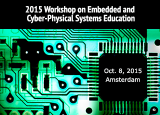 WESE 2015
WESE 2015
The WESE workshop series aims to bring researchers, educators, and industrial representatives together to assess needs and share design, research, and experiences in embedded and cyber-physical systems education. Embedded and cyber-physical systems design requires multidisciplinary skills from areas such as control and signal processing theory, electronics, computer engineering and science, networking, physical systems modeling, etc., as well as application domain knowledge. Demand for embedded and cyber-physical system engineers has motivated a growing interest in the question of educating specialists in this domain. As system designs grow more complex and the time to market diminishes, quality education becomes more and more important. The technological evolution manifested by CPS thus requires a corresponding evolution of engineering education, addressing questions such as "What skills and capabilities are required by the engineers of tomorrow", and "How should the corresponding educational programs be formed", in order to provide experts ready to engineer the Cyber-Physical Systems that will greatly impact our future society?
Special attention this year will be given to industrial and societal needs. The format of the workshop apart from keynotes, include regular and work-in progress paper presentations, and ample space for discussions to promote active exchange of ideas.
WESE 2015 is the 11th workshop in this series. The first workshop was held in 2005 in Jersey City. In 2012, the term "Cyber-Physical" was added to the workshop name, but the acronym was not modified. The inclusion of Cyber-Physical systems in the scope has broadened the scope and promises to attract a broader community both in terms of paper contributors and attendants. Since 2009, proceedings are included in the ACM digital library.
Topics and Focus
Particular topics of interest include:
- Industrial needs regarding embedded and cyber-physical systems education
- Experiences and trade-offs in curricula design and implementation
- Experiences of educational forms, e.g. MOOCs and remote labs
- Position papers regarding the curricula of tomorrow.
- Hands-on experiences, labs, "industry as lab"
- Educational aspects of
- Embedded systems, Cyber-physical systems, Internet of things
- Embedded Control, Interfaces to the physical world
- Real-time computing and Distributed systems issues
- Architecture, design and hardware/software co-design
- Embedded system networks
- Applications of embedded and cyber-physical systems
Program
Keynotes:
- Walid Taha (Halmstad University, Sweden): A First Course on Cyber-Physical Systems -- The Flipped Classroom Experience
- Michael Winokur (IAI, Israel): Challenges of starting a new Embedded Systems Specialty in an established EE Department
Paper submission:
- Work in progress papers should not exceed 4 double column, single space pages.
- Regular papers should not exceed 8 double column, single space pages.
- All contributions should be formatted using the template at http://www.acm.org/sigs/publications/proceedings-templates.
- For details about paper submission see www.wese2015.org.
- High visibility will be ensured due to the publication of selected articles in the ACM Digital Library
Important dates
- Paper submission deadline: August 1st, 2015
- Notification of results: September 5, 2015
- Final paper version: September 21, 2015
- Workshop: October 8th, 2015
Organizers
- Martin Torngren (chair), <martint@kth.se>, KTH, Sweden
- Martin Edin Grimheden (co-chair), <mjg@kth.se>, KTH, Sweden
- Falk Salewski (co-chair, dissemination), <falk.salewski@fh-muenster.de>, Muenster University of Applied Sciences, Germany
- The workshop is organized in collaboration with EIT ICT Labs (CPS action line), EMSIG (www.emsig.net), ACM SIGBED (http://sigbed.blogspot.se/), CPSE-Labs (http://www.cpse-labs.eu/) and the ARTEMIS-IA Education & Training WG (https://www.artemis-ia.eu ).
- International Program Committee
- Martin Torngren, KTH, Sweden
- Martin Grimheden, KTH, Sweden
- Jeff Jackson, University of Alabama, USA
- Hugo Andrade, National Instruments, USA
- Shiao-Li Tsao, National Chiao Tung University, Hsinchu, Taiwan
- Jonas Gustavsson, LTU, Sweden
- Tei-Wei Kuo, National Taiwan University, Taipei, Taiwan
- Alex Dean, North Carolina State University, USA
- Erwin Schoitsch, Austrian Inst. of Technology, Austria
- David Broman, UC Berkeley, USA, and KTH, Sweden
- Jogesh Muppala, Hong Kong University of Science and Technology, Hong Kong
- Saddek Bensalem, Univ. of Grenoble, France
- Walid Taha, Halmstad University, Sweden and Rice University, USA
- Lucia Lo Bello, University of Catania, Italy
- Peter Marwedel, TU Dortmund, Germany
- Bernhard Schatz, TU Munich and Fortiss, Germany
- Daniela Cancila, CEA, France
- Falk Salewski, Muenster University of Applied Sciences, Germany
- Janette Cardoso, Institut Superieur de l'Aeronautique et de l'Espace (ISAE), France
- Sang Hyuk Son, Daegu Gyeongbuk Inst. Of Science and Technology (DGIST), Korea



